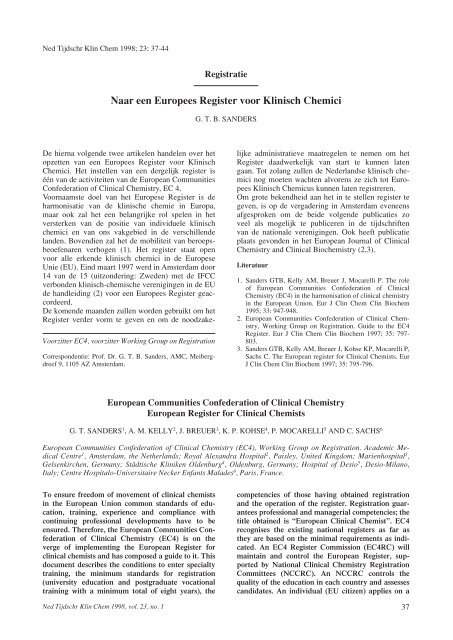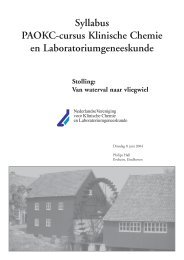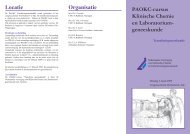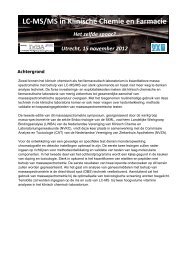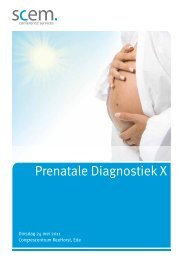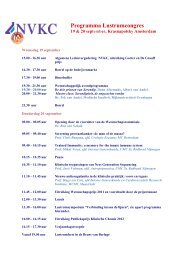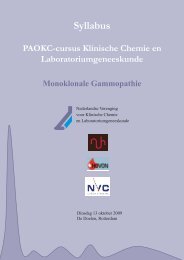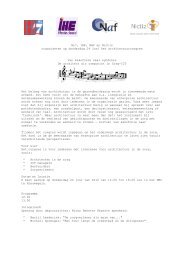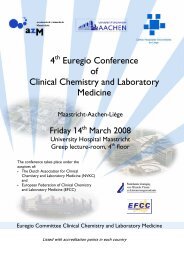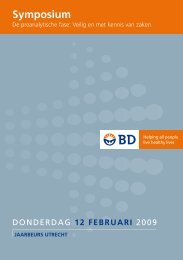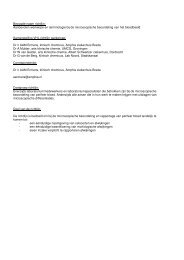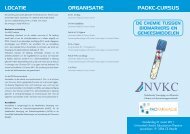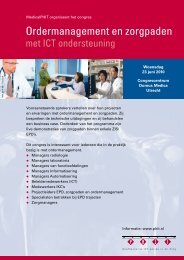Naar een Europees Register voor Klinisch Chemici - NVKC
Naar een Europees Register voor Klinisch Chemici - NVKC
Naar een Europees Register voor Klinisch Chemici - NVKC
You also want an ePaper? Increase the reach of your titles
YUMPU automatically turns print PDFs into web optimized ePapers that Google loves.
Ned Tijdschr Klin Chem 1998; 23: 37-44<br />
To ensure freedom of movement of clinical chemists<br />
in the European Union common standards of education,<br />
training, experience and compliance with<br />
continuing professional developments have to be<br />
ensured. Therefore, the European Communities Confederation<br />
of Clinical Chemistry (EC4) is on the<br />
verge of implementing the European <strong>Register</strong> for<br />
clinical chemists and has composed a guide to it. This<br />
document describes the conditions to enter specialty<br />
training, the minimum standards for registration<br />
(university education and postgraduate vocational<br />
training with a minimum total of eight years), the<br />
Ned Tijdschr Klin Chem 1998, vol. 23, no. 1<br />
Registratie<br />
<strong>Naar</strong> <strong>een</strong> <strong>Europees</strong> <strong>Register</strong> <strong>voor</strong> <strong>Klinisch</strong> <strong>Chemici</strong><br />
De hierna volgende twee artikelen handelen over het<br />
opzetten van <strong>een</strong> <strong>Europees</strong> <strong>Register</strong> <strong>voor</strong> <strong>Klinisch</strong><br />
<strong>Chemici</strong>. Het instellen van <strong>een</strong> dergelijk register is<br />
één van de activiteiten van de European Communities<br />
Confederation of Clinical Chemistry, EC 4.<br />
Voornaamste doel van het Europese <strong>Register</strong> is de<br />
harmonisatie van de klinische chemie in Europa,<br />
maar ook zal het <strong>een</strong> belangrijke rol spelen in het<br />
versterken van de positie van individuele klinisch<br />
chemici en van ons vakgebied in de verschillende<br />
landen. Bovendien zal het de mobiliteit van beroepsbeoefenaren<br />
verhogen (1). Het register staat open<br />
<strong>voor</strong> alle erkende klinisch chemici in de Europese<br />
Unie (EU). Eind maart 1997 werd in Amsterdam door<br />
14 van de 15 (uitzondering: Zweden) met de IFCC<br />
verbonden klinisch-chemische verenigingen in de EU<br />
de handleiding (2) <strong>voor</strong> <strong>een</strong> <strong>Europees</strong> <strong>Register</strong> geaccordeerd.<br />
De komende maanden zullen worden gebruikt om het<br />
<strong>Register</strong> verder vorm te geven en om de noodzake-<br />
Voorzitter EC4, <strong>voor</strong>zitter Working Group on Registration<br />
Correspondentie: Prof. Dr. G. T. B. Sanders, AMC, Meibergdreef<br />
9, 1105 AZ Amsterdam.<br />
G. T. B. SANDERS<br />
lijke administratieve maatregelen te nemen om het<br />
<strong>Register</strong> daadwerkelijk van start te kunnen laten<br />
gaan. Tot zolang zullen de Nederlandse klinisch chemici<br />
nog moeten wachten alvorens ze zich tot <strong>Europees</strong><br />
<strong>Klinisch</strong> Chemicus kunnen laten registreren.<br />
Om grote bekendheid aan het in te stellen register te<br />
geven, is op de vergadering in Amsterdam even<strong>een</strong>s<br />
afgesproken om de beide volgende publicaties zo<br />
veel als mogelijk te publiceren in de tijdschriften<br />
van de nationale verenigingen. Ook heeft publicatie<br />
plaats gevonden in het European Journal of Clinical<br />
Chemistry and Clinical Biochemistry (2,3).<br />
Literatuur<br />
1. Sanders GTB, Kelly AM, Breuer J, Mocarelli P. The role<br />
of European Communities Confederation of Clinical<br />
Chemistry (EC4) in the harmonisation of clinical chemistry<br />
in the European Union. Eur J Clin Chem Clin Biochem<br />
1995; 33: 947-948.<br />
2. European Communities Confederation of Clinical Chemistry,<br />
Working Group on Registration. Guide to the EC4<br />
<strong>Register</strong>. Eur J Clin Chem Clin Biochem 1997; 35: 797-<br />
803.<br />
3. Sanders GTB, Kelly AM, Breuer J, Kohse KP, Mocarelli P,<br />
Sachs C. The European register for Clinical Chemists. Eur<br />
J Clin Chem Clin Biochem 1997; 35: 795-796.<br />
European Communities Confederation of Clinical Chemistry<br />
European <strong>Register</strong> for Clinical Chemists<br />
G. T. SANDERS 1 , A. M. KELLY 2 , J. BREUER 3 , K. P. KOHSE 4 , P. MOCARELLI 5 AND C. SACHS 6<br />
European Communities Confederation of Clinical Chemistry (EC4), Working Group on Registration. Academic Medical<br />
Centre 1 , Amsterdam, the Netherlands; Royal Alexandra Hospital 2 , Paisley, United Kingdom; Marienhospital 3 ,<br />
Gelsenkirchen, Germany; Städtische Kliniken Oldenburg 4 , Oldenburg, Germany; Hospital of Desio 5 , Desio-Milano,<br />
Italy; Centre Hospitalo-Universitaire Necker Enfants Malades 6 , Paris, France.<br />
competencies of those having obtained registration<br />
and the operation of the register. Registration guarantees<br />
professional and managerial competencies; the<br />
title obtained is “European Clinical Chemist”. EC4<br />
recognises the existing national registers as far as<br />
they are based on the minimal requirements as indicated.<br />
An EC4 <strong>Register</strong> Commission (EC4RC) will<br />
maintain and control the European <strong>Register</strong>, supported<br />
by National Clinical Chemistry Registration<br />
Committees (NCCRC). An NCCRC controls the<br />
quality of the education in each country and assesses<br />
candidates. An individual (EU citizen) applies on a<br />
37
private basis for the European <strong>Register</strong> to EC4RC<br />
and, where applicable, accompanied by a statement<br />
from the NCCRC of the country of registration,<br />
stating that the applicant has the necessary qualifications.<br />
For EU citizens trained outside the EU the<br />
final decision is with EC4RC. Non-EU citizens<br />
trained in an EU country may apply for registration,<br />
supported by the NCCRC that granted national registration;<br />
non-EU citizens not trained in an EU<br />
country are not eligible for registration. Renewal of<br />
registration is once every five years.<br />
Key words: European <strong>Register</strong>; harmonisation; professional<br />
training<br />
Introduction to the document<br />
The Treaty of Rome allowed freedom of movement<br />
within the European Union (EU) but in practice did<br />
not ensure employment as national diplomas were not<br />
recognised throughout the EU. In health care the<br />
public must be safeguarded by ensuring that practitioners<br />
are competent to practice. However employers<br />
and job-seekers have difficulties in proving competence<br />
if the applicant has b<strong>een</strong> trained in another<br />
Member State.<br />
The EU has attempted to overcome such difficulties<br />
by:<br />
Sectoral Directives (issued betw<strong>een</strong> 1975-85). The<br />
minimum standards of education, training and experience<br />
are agreed at EU level. National diplomas<br />
which meet the criteria are agreed and published.<br />
They are automatically and mutually recognised, e.g.<br />
for medical doctors, general nurses, midwives, pharmacists,<br />
dentists, veterinary surgeons and architects.<br />
General Directives (89/48/EEC, 92/51). Member<br />
States retain the right to regulate a profession and to<br />
determine the level of education, training and experience<br />
required to practice. National diplomas are not<br />
automatically recognised throughout the EU and a<br />
Member State may require a period of adaptation or<br />
demonstration of aptitude before recognising the<br />
competence of a professional from another EU<br />
Introduction<br />
1.0 Clinical Chemistry<br />
2.0 EC4<br />
2.1 Objectives<br />
Final Version<br />
Country e.g. physiotherapists, occupational therapists.<br />
European <strong>Register</strong>. A profession at EU level agrees<br />
common standards of competence and national<br />
diplomas which meet these criteria. Registration<br />
is voluntary e.g. engineers (EUR.ING), chemists<br />
(EUR.CHEM.).<br />
Clinical chemists have always recognised the benefits<br />
of automatic mutual recognition of national diplomas<br />
which meet agreed standards and applied for recognition<br />
of the profession by a sectoral directive in 1978<br />
and 1990. There was however no political support as<br />
the Commission’s efforts were concentrated on the<br />
larger professions. The General Directive did not<br />
benefit the profession at EU level as regulation of the<br />
profession depends on each Member State. The European<br />
Communities Confederation of Clinical Chemistry<br />
(EC4) therefore agreed to progress recognition<br />
of the profession by establishing a register.<br />
The European <strong>Register</strong> for Clinical Chemists ensures<br />
common standards of education, training, experience<br />
and compliance with continuing professional development<br />
of all registrants. The standards have b<strong>een</strong><br />
agreed by the national societies of clinical chemistry.<br />
Four important benefits result from the register:<br />
- public health is safeguarded<br />
- a registrant is automatically recognised as competent<br />
to practice within the EU<br />
- high standards of education and training prevail<br />
throughout the EU<br />
- the profile of clinical chemistry is raised within the<br />
EU.<br />
For the individual clinical chemist registration as a<br />
European Clinical Chemist means:<br />
- that he or she can prove to be a qualified clinical<br />
chemist since a guarantee for professional qualifications<br />
is given<br />
- facilitation of free movement within the European<br />
Union<br />
- support for recognition in those member states<br />
where under local law no protection of the profession<br />
exists.<br />
European Communities Confederation of Clinical Chemistry<br />
Guide to the EC4 <strong>Register</strong><br />
European Clinical Chemist<br />
Final version approved at the EC4 <strong>Register</strong> launching meeting in Amsterdam, March 8th 1997<br />
Contents<br />
The EC4 <strong>Register</strong><br />
3.0 Premise<br />
4.0 Professional training<br />
38 Ned Tijdschr Klin Chem 1998, vol. 23, no. 1
5.0 Minimum Standards<br />
5.1 Minimum standards to enter specialty training<br />
5.2 Minimum standards for registration as a European<br />
Clinical Chemist<br />
5.3 Evolution of Clinical Chemistry<br />
6.0 Title<br />
7.0 Competencies<br />
8.0 National registers<br />
8.1 Transitional situation<br />
Operation of the <strong>Register</strong><br />
9.0 EC4 bodies<br />
9.1 The EC4 <strong>Register</strong> Commission, EC4RC<br />
9.2 The National Clinical Chemistry <strong>Register</strong><br />
Committees, NCCRCs<br />
9.3 The EC4 Committee of Appeal, EC4CA<br />
9.4 Custody of the European <strong>Register</strong><br />
Procedures<br />
10.0 Application<br />
10.1 Validation of applications<br />
10.1.1 EU citizens trained within the EU<br />
10.1.2 EU citizens trained outside the EU<br />
10.1.3 Non-EU citizens<br />
10.2 Registration as a European Clinical Chemist<br />
10.3 Certificates<br />
10.4 Renewal of registration<br />
10.5 Finances<br />
Points of Contention<br />
EC4 Code of Conduct<br />
Introduction<br />
1.0 Clinical Chemistry<br />
According to the definition of the International<br />
Federation of Clinical Chemistry (IFCC), the<br />
name Clinical Chemistry will be used<br />
throughout this document. The specialty is<br />
defined as follows:<br />
“Clinical Chemistry is the application of<br />
chemical, molecular and cellular concepts and<br />
techniques to the understanding and the evaluation<br />
of human health and disease.<br />
At the core of the discipline is the provision of<br />
results of measurements and observations relevant<br />
to the cause of disease, the maintenance<br />
of health and the conversion of these data into<br />
specific and general patient and disease related<br />
information at the laboratory clinician interface.<br />
The discipline is committed to deepening<br />
understanding of health and disease through<br />
fundamental and applied research.”<br />
Ned Tijdschr Klin Chem 1998, vol. 23, no. 1<br />
In addition it is stated that:<br />
“Clinical Chemistry is the largest subdiscipline<br />
of Laboratory Medicine which is a multidisciplinary<br />
medical and scientific specialty with<br />
several interacting subdiciplines such as haematology,<br />
immunology, clinical biochemistry,<br />
and others. Through these activities clinical<br />
chemists influence the practice of medicine for<br />
the benefit of the public.<br />
In many countries, the practice of clinical<br />
chemistry includes traditional clinical biochemistry<br />
as well as some components of<br />
microbiology, haematology, molecular biology<br />
and immunology.<br />
Clinical Chemists are responsible for comprehensive<br />
laboratory services including, for<br />
example, management, quality assurance and<br />
informatics. They frequently conduct research<br />
in laboratory medicine. For these reasons their<br />
professional education needs to include basic<br />
scientific, analytical, clinical and management<br />
training combined with informatics.”<br />
Where “analysis” is written, the complete analytical<br />
process, including pre- and post-analytical<br />
phases, is understood.<br />
In different Member States of the European<br />
Union (EU) the designation for Clinical Chemistry<br />
appears either by specialty denomination<br />
of Clinical Chemistry or associated with or<br />
included in other specialties under a broader<br />
denomination.<br />
The designations for the specialty of Clinical<br />
Chemistry as used in the Member States of the<br />
EU are:<br />
- clinical biology:<br />
Belgium biologie clinique/klinische<br />
biologie<br />
France biologie clinique<br />
Italy biochimica clinica<br />
patologia clinica<br />
Luxembourg biologie clinique/<br />
biochemie<br />
- clinical biochemistry:<br />
Denmark klinisk biokemi<br />
Finland kliinine (bio)kemia<br />
Ireland clinical biochemistry<br />
Spain bioquímica clínica<br />
United Kingdom clinical biochemistry /<br />
clinical chemistry /<br />
chemical pathology<br />
- clinical chemistry:<br />
Austria <strong>Klinisch</strong>e Chemie<br />
Germany <strong>Klinisch</strong>e Chemie<br />
Greece klinikè chimeia<br />
Netherlands klinische chemie<br />
Portugal química clínica<br />
Sweden klinisk kemi<br />
39
2.0 EC4<br />
The European Communities Confederation of<br />
Clinical Chemistry (abbreviated as EC4) is the<br />
organisation linking all clinical chemistry<br />
associations within the different member states<br />
of the European Union (EU), recognised by<br />
the International Federation of Clinical Chemistry<br />
(IFCC) for that member state within the<br />
EU. It was founded in 1973 and its constitution<br />
formalised in 1993.<br />
Moreover, close links exist with the Forum of<br />
European Societies of Clinical Chemistry<br />
(FESCC), which is the European organisation<br />
of clinical chemistry associations, recognised<br />
by the IFCC within the whole of Europe, as it<br />
is defined by the World Health Organisation.<br />
2.1 Objectives<br />
The objects for which EC4 was established<br />
are:<br />
a) to promote the advancement of Clinical<br />
Chemistry within the European Union, and<br />
to do all such things as may in the opinion<br />
of the Board of EC4 spread or increase the<br />
knowledge and standing of Clinical Chemistry<br />
within the EU, co-operating thereby in<br />
conjunction with FESCC and IFCC;<br />
b) to advise the European Union on Clinical<br />
Chemistry matters;<br />
c) to co-operate with standardisation bodies in<br />
all matters relating to Clinical Chemistry;<br />
d) to promote the regulation of the profession<br />
of Clinical Chemistry in the EU by maintaining<br />
a <strong>Register</strong> and by furthering the<br />
establishment of a Directive describing the<br />
practitioners of the discipline and the standards<br />
of education, training and experience<br />
required to achieve “<strong>Register</strong>ed Clinical<br />
Chemist” status;<br />
e) to promote the recognition of the European<br />
Clinical Chemist title and to protect it;<br />
f) to foster high standards of professional<br />
education and practice by organising and<br />
auditing through the National Associations<br />
of Member States training programmes for<br />
practitioners of the profession and programmes<br />
of continuing education for practitioners<br />
of the profession, and by regularly<br />
reviewing them;<br />
g) to co-operate with any examining body in<br />
Medicine or a basic science subject in promoting<br />
suitable qualifying examinations<br />
for members of the profession of Clinical<br />
Chemistry;<br />
h) to promote accreditation of laboratories<br />
where clinical chemistry is practised by the<br />
formulation of standards which encompass<br />
all aspects of quality and to recognise a<br />
body within the Member State to ensure<br />
that such standards are met;<br />
i) to co-ordinate the examination and evaluation<br />
of scientific equipment and reagents<br />
for use in Clinical Chemistry laboratories;<br />
j) to advise on suitable design and size of<br />
laboratories.<br />
In pursuit of these aims EC4 maintains a<br />
<strong>Register</strong> to which individuals may be admitted<br />
provided they meet the specified minimum<br />
requirements.<br />
The EC4 <strong>Register</strong><br />
3.0 Premise<br />
In each Member State laboratory medicine is<br />
organised within its own national health care<br />
system. EC4 respects these different structures<br />
and has created a <strong>Register</strong> based on a Syllabus<br />
for post-graduate training in order to:<br />
a) guarantee that the minimal requirements<br />
for the education and training of the individual<br />
clinical chemist have b<strong>een</strong> fulfilled<br />
for the benefit of health care in general, the<br />
individual patient, and the employer;<br />
b) facilitate the comparability of professional<br />
training of clinical chemists inside the EU<br />
and to establish a framework of mutual<br />
recognition of qualifications in order to<br />
provide clinical chemists who wish to practise<br />
outside their country with a guarantee<br />
of ability;<br />
c) to encourage a continuous updating of the<br />
quality of Clinical Chemistry and its practitioners<br />
by setting, monitoring and reviewing<br />
standards for the definition and practice<br />
of Clinical Chemistry in the EU;<br />
d) to provide a source of information about<br />
the different systems of education and<br />
training in the Member States.<br />
4.0 Professional training<br />
EC4 has judged the respective values of the<br />
educational and professional systems in Europe<br />
and composed a Syllabus comprising all subjects<br />
necessary to achieve a high level of professional<br />
competence.<br />
This European Syllabus for post-graduate<br />
training in Clinical Chemistry (latest version:<br />
November 1991, revision in preparation) describes<br />
the minimal scientific content of professional<br />
knowledge and training, appreciating<br />
the responsibility of each Member State to<br />
organise laboratory medicine within its own<br />
national health care system. Thus, although<br />
significant differences exist in the practice of<br />
Clinical Chemistry throughout the EU, a great<br />
number of core elements can be discerned.<br />
These are considered to be the minimum scientific<br />
requirements for those who want to be<br />
registered as a specialist. The attainment of<br />
these competencies is the threshold which<br />
opens the right to registration. Since the professional<br />
activities also imply in most cases<br />
managerial responsibilities, it is important that<br />
the subject of laboratory organisation and<br />
management is included in this training period.<br />
40 Ned Tijdschr Klin Chem 1998, vol. 23, no. 1
The specialist who is registered on the basis of<br />
the above standards not only fulfils the professional<br />
objectives of EC4 but is also eligible to<br />
be the head of a laboratory, one of the conditions<br />
necessary for its accreditation (Section<br />
2.1 h).<br />
5.0 Minimum standards<br />
The education of Clinical Chemists in the EU<br />
can be said to be based in all countries on an<br />
identical scheme. It comprises a university<br />
education, followed by a specialisation in<br />
Clinical Chemistry. The standards stipulated<br />
below are the minimum required for admission<br />
to the register.<br />
5.1 Minimum standards to enter specialty training<br />
The minimum standard to enter specialty<br />
training is a university degree in medicine,<br />
chemistry, biochemistry, pharmacy or another<br />
relevant basic science subject which allows<br />
entry to the post-university specialty training.<br />
5.2 Minimum standards for registration as a European<br />
Clinical Chemist<br />
The minimum standard for registration as a<br />
European Clinical Chemist is a total of eight<br />
years of university and postgraduate study. A<br />
minimum of four years of postgraduate study<br />
after gaining a university degree must be spent<br />
on specialist training in a laboratory in a<br />
medical environment approved and supervised<br />
by the national body functioning for that purpose<br />
within the health care system of the<br />
Member State.<br />
5.3 Evolution of Clinical Chemistry<br />
In a number of countries within the EU there is<br />
an increasing trend for Clinical Chemistry to<br />
encompass a number of disciplines. As a result<br />
the professional training can be multidisciplinary<br />
(i.e. Clinical Chemistry and for example<br />
Haematology, Immunology, etc) as well as in a<br />
single discipline (i.e. Haematology). Training<br />
could be multidisciplinary initially, followed<br />
by specialisation. In all cases the conditions as<br />
specified in Section 5.2 will be valid.<br />
6.0 Title<br />
Registration as “European Clinical Chemist”<br />
gives the right to be called European Clinical<br />
Chemist in the language of the National<br />
Member State and to use the professional title<br />
European Clinical Chemist (invariable in all<br />
member countries) with the national title, if<br />
lawful.<br />
7.0 Competencies<br />
Clinical chemists having obtained registration<br />
in the EC4 register for Clinical Chemistry<br />
should be aware of their professional responsibilities<br />
and should have achieved competence<br />
in the following:<br />
Ned Tijdschr Klin Chem 1998, vol. 23, no. 1<br />
a) understanding of the registrants’ responsibility<br />
in the practice of his profession to the<br />
well-being and personal safety of his colleagues,<br />
co-workers and patients, to the<br />
community, and to the environment;<br />
b) thorough knowledge of all aspects of<br />
clinical laboratory sciences relevant to the<br />
discipline practised as specified in the Syllabus<br />
(Section 4.0);<br />
c) ability to obtain, to explore, and to employ<br />
knowledge and methods of investigation in<br />
the interest of health care and mankind;<br />
d) broad knowledge of and insight into biochemical<br />
processes in human health and<br />
disease on a general and patient-specific<br />
level;<br />
e) ability to work in a multidisciplinary environment<br />
and function as a consultant to<br />
his clinical colleagues and liaise with them<br />
in the interpretation of laboratory results;<br />
f) ability to safeguard and protect the public<br />
against misuse of medical laboratory investigations;<br />
g) knowledge of the principles of management<br />
leading to adequate direction, supervision<br />
and organisation of a laboratory<br />
department in a hospital or in any other<br />
health care environment resulting in the<br />
provision of competent service as laid<br />
down in a laboratory quality manual, based<br />
on good laboratory practice;<br />
h) ability to assess conflicting and multivarious<br />
technical, financial and human considerations<br />
(e.g. care, quality, safety, cost,<br />
and time scale) both in the short and long<br />
terms and to find the optimal solution in<br />
relation to patient care;<br />
i) adequate ability to apply current techniques<br />
in human resources management;<br />
j) ability to communicate orally and in<br />
writing, including the production of clear,<br />
cogent reports and publications in refereed<br />
international scientific journals;<br />
k) knowledge of the use of technology and<br />
analytical techniques relevant to the field of<br />
specialisation, an active appreciation of<br />
developments and an attitude of innovation<br />
and creativity in their implementation in<br />
the profession of clinical chemistry;<br />
l) appreciation of developments both in<br />
science and technology and also in the<br />
understanding of disease in order to ensure<br />
the appropriate use of laboratory investigations<br />
and to optimise the advice provided<br />
on those investigations.<br />
8.0 National registers<br />
EC4 acknowledges the national registers as<br />
they function in the Member Countries and<br />
provided that they are in accordance with the<br />
minimum requirements and based on curricula<br />
making it possible for candidates to develop<br />
towards professional competence as described<br />
41
in Section 4. In those Member States in the EU<br />
where Clinical Chemistry training is not (yet)<br />
organised according to the pre-defined requirements,<br />
the EC4 Board, the EC4RC (Section<br />
9.1) and the National Registration Commission<br />
(Section 9.2) need to ensure that that standards<br />
required for each national register meet the<br />
minimum standards required for the EC4<br />
<strong>Register</strong>.<br />
The extra duration of the education in EC4<br />
terms should be specified.<br />
8.1 Transitional situation<br />
EC4 realises that at the introduction of the<br />
<strong>Register</strong> described in this document, a transitional<br />
period will be necessary before all conditions<br />
can be fulfilled, before an individual<br />
may be registered.<br />
Operation of the <strong>Register</strong><br />
9.0 EC4 bodies<br />
The EC4 Board via its EC4 <strong>Register</strong> Commission<br />
(EC4RC, Section 9.1) is responsible for<br />
the <strong>Register</strong> and for modification of the standards<br />
in the light of changing technology or<br />
other developments. Standards are accordingly<br />
reviewed at regular intervals of not more than<br />
5 years.<br />
The European <strong>Register</strong> is maintained by the<br />
EC4RC, (Section 9.1) and is administered by<br />
the EC4 Secretariat General which keeps<br />
records of the registrations. Whenever possible<br />
the EC4RC will in its decisions seek advise of<br />
the National Clinical Chemistry <strong>Register</strong> Committees,<br />
NCCRCs (Section 9.2).<br />
9.1 The EC4 <strong>Register</strong> Commission, EC4RC<br />
The <strong>Register</strong> Commission is composed of one<br />
delegate from each Member State, preferably<br />
members of the NCCRC, and one member of<br />
the Board of EC4 who also chairs the meetings.<br />
National delegates would be members of<br />
the national society recognised by IFCC but<br />
they need not be officers of that society.<br />
By the 1st of March of each year the EC4RC<br />
circulates to its members a list of all applicants<br />
for the European Clinical Chemist Title made<br />
during the previous calendar year.<br />
9.2 The National Clinical Chemistry <strong>Register</strong><br />
Committees, NCCRCs<br />
The National Clinical Chemistry <strong>Register</strong> Committees,<br />
NCCRCs are national bodies composed<br />
of representatives from the national clinical<br />
chemistry associations and the Government, or<br />
any other body recognised for the purpose in<br />
that Member State. It is the task of these Committees<br />
to keep EC4RC well informed on the<br />
national education structure. The NCCRC<br />
assesses the suitability of candidates to hold<br />
the title of <strong>Register</strong>ed Clinical Chemist of that<br />
Member State. Registrants in their National<br />
<strong>Register</strong> may then apply to EC4RC to be<br />
recognised as European Clinical Chemist.<br />
In January of each year, the EC4 Secretariat<br />
General communicates to NCCRCs any agreed<br />
changes to the <strong>Register</strong> of European Clinical<br />
Chemists.<br />
9.3 The EC4 Committee of Appeal, EC4CA<br />
The EC4 Committee of Appeal, EC4CA, is a<br />
European body composed of independent experts<br />
from representative Member States.<br />
EC4CA acts on behalf of the EC4 Board in<br />
adjudicating on cases of applicants who appeal<br />
against a decision of the EC4 Board not to<br />
grant registration. EC4CA also advises the<br />
Board and EC4RC on equivalence when applicants<br />
have not followed standard education or<br />
training programmes.<br />
9.4 Custody of the European <strong>Register</strong><br />
The European register is kept by the EC4RC.<br />
As stated under 9.2 in January of each year,<br />
the EC4 Secretariat General communicates to<br />
NCCRCs any agreed changes to the <strong>Register</strong><br />
of European Clinical Chemists.<br />
Procedures<br />
10.0 Application<br />
Application is open only to individuals who<br />
have the required qualifications, i.e. they must<br />
be trained and/or registered in an EU-country.<br />
10.1 Validation of applications<br />
10.1.1 EU citizens trained within the EU<br />
As a general rule an EU citizen registered in<br />
an EU country is automatically eligible for EU<br />
registration by the EC4RC. It is the responsibility<br />
of the NCCRC of the country of registration<br />
to check the validity of his university<br />
education (as specified in 5.1) and professional<br />
training. Consequently, the minimum EC4<br />
requirement has then b<strong>een</strong> fulfilled (Sections<br />
5.2 and 5.3).<br />
An EU citizen who is not registered in an EU<br />
country, but was trained within the EU can<br />
apply for an EU registration to the EC4RC. It<br />
is the responsibility of the EC4RC to check the<br />
validity of his university education and professional<br />
training (see previous paragraph).<br />
All applications must be made directly to<br />
EC4RC, and where applicable, accompanied<br />
by a statement from the NCCRC of the<br />
country of registration supporting the applicant<br />
and stating that the applicant has the necessary<br />
qualifications for registration as a European<br />
Clinical Chemist.<br />
If the education and training are assessed as<br />
adequate it would be assumed that the applicant<br />
has achieved competence as defined in<br />
Section 7.0.<br />
42 Ned Tijdschr Klin Chem 1998, vol. 23, no. 1
10.1.2 EU citizens trained outside the EU<br />
EU citizens trained outside the EU and registered<br />
in an EU country can be considered for<br />
EU registration only if they have undergone an<br />
university education and professional training<br />
which meets the EC4 criteria. It is for the<br />
NCCRC of the country of registration to provide<br />
the EC4RC with the evidence to support<br />
the candidate. The final decision is with the<br />
EC4RC. The EC4RC does not give general<br />
decisions on the equivalence of diplomas or<br />
degrees accepted in EU member states.<br />
10.1.3 Non-EU citizens<br />
Non-EU citizens may be eligible for registration<br />
only if education and/or training of the<br />
applicant has taken place in an EU country<br />
according to the predefined conditions. The<br />
NCCRC of the country of training (and, when<br />
different, of country of registration) must support<br />
the application.<br />
Non-EU citizens not trained in an EU country<br />
are not eligible for registration.<br />
10.2 Registration as a European Clinical Chemist<br />
The EC4RC decides on the basis of Sections<br />
10.0 and 10.1. the eligibility of the candidate<br />
for registration. Successful candidates will be<br />
included in the <strong>Register</strong> centrally maintained<br />
by the Secretariat General.<br />
Persons registered as European Clinical Chemists<br />
must abide by the EC4 Code of Conduct.<br />
Any application not approved will be returned<br />
to the NCCRC and reasons for failure will be<br />
given.<br />
In cases where the decision of the EC4RC is<br />
contested the EC4 Committee of Appeal may<br />
be engaged.<br />
10.3 Certificates<br />
Registration as a European Clinical Chemist is<br />
attested by a certificate prepared by the Secretariat<br />
General and signed by the President and<br />
one Board Member of EC4.<br />
10.4 Renewal of registration<br />
Continuing Registration as a European Clinical<br />
Chemist being dependent on the registrant<br />
remaining in practice and observing the EC4<br />
Code of Conduct.<br />
Registration should be renewed every five<br />
years through the relevant NCCRC.<br />
10.5 Finances<br />
EC4 and each national Clinical Chemistry<br />
association bear the costs of the administrative<br />
work involved in operating the <strong>Register</strong> and<br />
are entitled to recover this cost by charging a<br />
life spanning fee to the applicants.<br />
Ned Tijdschr Klin Chem 1998, vol. 23, no. 1<br />
Points of Contention<br />
All cases of doubt or difficulty, relating to<br />
decision on individual applications, are<br />
referred to the EC4 Committee of Appeal (see<br />
9.3) for decision. An individual may subsequently<br />
appeal in writing against this decision<br />
to the EC4 Board, whose decision is final and<br />
without appeal.<br />
EC4 Code of Conduct<br />
The EC4, considering<br />
that one of the primary goals of EC4 is to stimulate<br />
the development of the profession of clinical chemist<br />
and to maintain his professional activities at a very<br />
high level<br />
that EC4 has set up a European registration system,<br />
in which clinical chemists of all countries affiliated to<br />
the EC4 can be registered<br />
that one of the conditions in order to get registered is<br />
that the clinical chemist involved undertakes to<br />
comply with this Code of Conduct<br />
that this Code of Conduct is additional to and does<br />
not replace any Code of Conduct to which the registrant<br />
might be subject in his own country<br />
has adopted the following Code of Conduct:<br />
1. The clinical chemist shall put his knowledge<br />
and ability concerning laboratory diagnostics<br />
(among which the indication for analyses, the<br />
reliability of the results, the interpretation and<br />
scientific research) at the service of diagnosis,<br />
therapy and prevention of human and animal<br />
diseases.<br />
2. In order to pursue an optimal fulfilment of his<br />
tasks and in accordance with what is regarded<br />
as a good practice in his profession and having<br />
regard to the laws of the country in which he is<br />
working, the clinical chemist shall<br />
a) maintain his competence at the highest<br />
level of quality by following all relevant<br />
(scientific and practical) developments concerning<br />
health care in general and clinical<br />
chemistry in particular, by participating in<br />
relevant training courses and by practising<br />
his profession on a regular basis;<br />
b) accept assignments only within the area of<br />
his competence; beyond this limit, he will<br />
seek the collaboration of appropriate experts.<br />
3. The professional integrity and intellectual honesty<br />
of the clinical chemist shall be the guarantees<br />
of his impartiality of analysis, judgement<br />
and consequent decision.<br />
43
4. The clinical chemist shall at any time avoid<br />
deceit in professional and scientific respect,<br />
such as fraud, plagiarism, concealment, improper<br />
omission of information, and expressing<br />
incorrect or misleading opinions.<br />
5. Without prejudice to legislation on privacy<br />
applicable in the country where he is working,<br />
the clinical chemist will consider himself<br />
bound to respect the confidentiality of information<br />
obtained by him in his professional<br />
work. The clinical chemist will be on his guard<br />
against misuse of such information.<br />
6. The clinical chemist will serve the individual<br />
patient to the best of his ability and provide the<br />
general public with clear information, only in<br />
his field of competence, to enable a proper<br />
understanding of health care matters of public<br />
interest.<br />
7. The clinical chemist will display his commitment<br />
to the Clinical Chemistry profession by<br />
taking part in the activities of its associations,<br />
notably those which promote the profession<br />
and contribute to continuing training of their<br />
members.<br />
8. As head and/or member of the team operating<br />
in the Clinical Chemistry laboratory, the clinical<br />
chemist will, given the specific circumstance<br />
of the situation concerned:<br />
a) obtain a clear definition of the services<br />
required of him and/or his team;<br />
b) see to it that all activities in the laboratory<br />
will be organised and executed as accurately<br />
and quickly as possible;<br />
c) take care of the safety and well-being of his<br />
colleagues and be conscious of nature and<br />
environment;<br />
d) behave himself honestly and respectfully<br />
towards the personal rights of his superiors,<br />
colleagues and subordinates by taking due<br />
account of their requirements and aspirations,<br />
provided they conform to the laws<br />
and ethics of their professions;<br />
e) strive for a high level of technical achievement<br />
which will also contribute to and promote<br />
a healthy and agreeable environment<br />
for his colleagues.<br />
9. The clinical chemist will not accept any obligation<br />
that brings him in conflict with his<br />
professional independence. In particular he<br />
undertakes:<br />
a) not to solicit for, or accept, gifts, pecuniary<br />
advantages or benefits from the medical<br />
product or diagnostic industry, unless they<br />
are inexpensive and relevant to the practice<br />
of the clinical chemist;<br />
b) not to solicit for, or accept, hospitality at<br />
sales promotions, symposia or congresses<br />
and the like unless this hospitality is reasonable<br />
in level and secondary to the main<br />
purpose of the meeting and does not extend<br />
to persons other than health professionals;<br />
c) not to accept financial support from the<br />
industry, directly or indirectly, other than<br />
for events for purely professional and<br />
scientific purposes; such gifts must always<br />
be reasonable in level and remain subordinate<br />
to the main scientific object of the<br />
event and it must not be extended to other<br />
than health professionals.<br />
NB. In this text “he” and “his” are taken respectively<br />
for “he/she” and “his/her”.<br />
44 Ned Tijdschr Klin Chem 1998, vol. 23, no. 1


